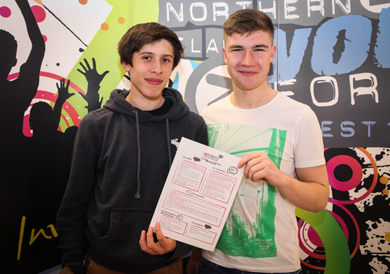Votes at 16, the legalisation of same sex marriages and a call on all parties to work for a solution to flags, parades and the past… these were just three of the issues mapped out in the manifesto which was launched by the inaugural Northern Ireland Youth Congress on October 29.
[caption id="attachment_52789" align="alignleft" width="390"] Ross Connolly from Killyleagh (right) with Asa Mallon from Lisburn at the launch of the Northern Ireland Youth Congress manifesto at the NIYF offices in Belfast.[/caption]
Ross Connolly from Killyleagh (right) with Asa Mallon from Lisburn at the launch of the Northern Ireland Youth Congress manifesto at the NIYF offices in Belfast.[/caption]
Members of the NI Youth Congress met at the headquarters of the Northern Ireland Youth Forum (NIYF) at Berry Street in Belfast for the launch of its first manifesto.
Among them was Ross Connolly (16) from Killyleagh, a student at Down High School in Downpatrick.
The document is the work of the 35-strong Forum which was elected by more than 7,000 young people in February to represent their views.
NIYF Director Chris Quinn said the manifesto strongly reflected the issues that really matter to the young people of Northern Ireland.
He said: “These impressive young representatives were elected by their peers to give a voice to the youth in Northern Ireland. The manifesto is a plea from young people for reform and it is incumbent on politicians of all parties to listen to what they have to say.”
His words were echoed by Matthew Carson, the recently elected Chair of the NIYF Executive Committee and a member of the Youth Congress.
He said: “The manifesto reflects the bread and butter issues that affect the lives of all young people in Northern Ireland regardless of religion, race and sexual identity. It is a glimpse into the future of Northern Ireland and we are calling on MLAs to engage seriously with us.”
The manifesto is divided into five sections: health, education, community, participation and democracy and transport.
On health it calls upon the Department of Health to carry out a review of Youth Mental Health provision and the lifetime ban on gay men giving blood in Northern Ireland to be lifted.
In education, the manifesto calls for a continued freeze on university tuition fees and for schools and industry to work together on better work experience provision.
In the community section it calls on the parties to ensure all policies work towards creating a shared future for young people regardless of race, religion or political belief and for the development of an action plan to prevent cyber bullying.
Votes for 16 and 17-year-olds is the headline policy in its participation and democracy section but it also supports the normalisation of government structures in Northern Ireland including the introduction of an official opposition.
Under transport, it calls for free public transport for all young people under 16 and the improvement in rural transport to improve access to health, education and employment provision.
The NI Youth Congress was set up by the Northern Ireland Youth Forum (NIYF) earlier this year with the intention of paving the way for a Northern Ireland Youth Assembly that will shadow the Stormont Assembly. It is composed of politically aware and determined young activists who are working to ensure change for the better in Northern Ireland.
***
The Youth Congress is a body of youth representatives aged 11-25 from across Northern Ireland. The Youth Congress came about after a long campaign for a Northern Ireland Youth Assembly. In the absence of a youth assembly members of the NI Youth Forum Executive Committee developed this innovative project to provide a platform so that young people across NI could come together to work toward social change and to ensure young people’s voices are being listened too at the highest levels
The purpose of the Youth Congress is to:
* provide a youth led; democratic; representative voice for young people in Northern Ireland; * provide a mechanism whereby young people can raise and discuss issues of importance to them and bring directly to the attention of elected decision makers. * to support young people to campaign and lobby on issues that are important to them on a regional, national and European basis. * provide a mechanism whereby government departments can seek the views of young people.
]]>

























